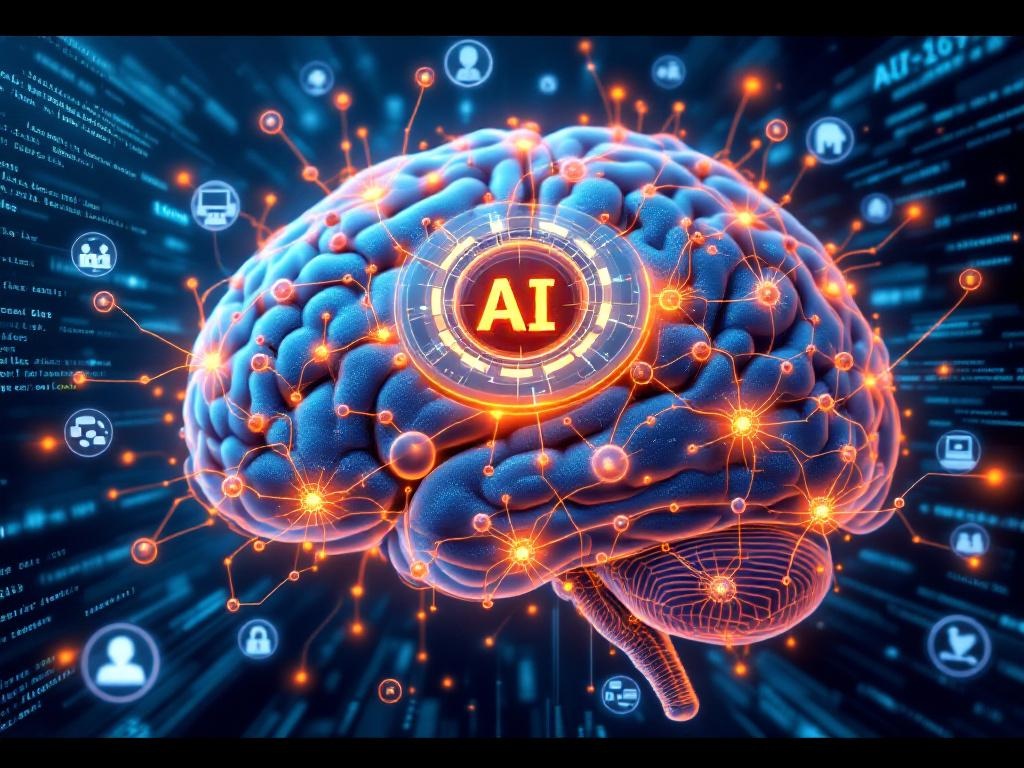Agentic AI is shaping a new horizon for businesses, with smart, autonomous agents poised to take on 15% of daily work decisions by 2028. This seismic shift will revolutionize not just efficiency, but strategic vision, offering unprecedented competitive advantages and innovative customer engagement.
The Rise of Agentic AI in Business
The agentic AI revolution marks a pivotal shift in the business landscape, as enterprises move towards incorporating autonomous AI systems into their core decision-making processes. Distinct from traditional AI, agentic AI brings to the table a level of autonomy that enables it to make decisions and carry out tasks without human intervention, thereby redefining the capabilities and expectations of artificial intelligence in a business context. This emergence of agentic AI is not just an incremental change; it’s a transformative movement that promises to overhaul how businesses operate, strategize, and interact with their customers.
At the heart of this transformation is the ability of agentic AI to automate complex processes and proactively solve problems. Unlike conventional AI, which relies on specific instructions and predefined algorithms, agentic AI systems learn from their environment and continuously adapt to new data and situations. This allows them to handle tasks that were previously considered too nuanced or variable for machines, such as managing dynamic customer service interactions or optimizing intricate supply chain logistics in real time. By doing so, agentic AI systems are anticipated to manage about 15% of daily work decisions by 2028, signifying their integral role in future business operations.
The impact of agentic AI is also profoundly felt in its capacity for automation and proactive problem-solving. For example, in customer service, agentic AI is projected to handle 68% of interactions by 2028, utilizing natural language processing and continuous learning to provide personalized, efficient support. This capability extends beyond mere automation; it enables these systems to predict customer inquiries and offer solutions even before the customer identifies a potential problem, thereby enhancing customer satisfaction and loyalty.
In the realm of business transformation, agentic AI is also proving to be a game-changer. Its adoption across enterprise functions—from HR and finance to marketing and operations—is driven by its promise of efficiency and improved decision-making. Consider the example of supply chain management, a domain traditionally fraught with unpredictability. Agentic AI can not only monitor and manage inventory levels in real-time but also predict shifts in demand or identify potential disruptions in the supply chain, thereby ensuring operational continuity and profitability.
For businesses to successfully harness the potential of agentic AI, a significant shift in mindset and operational models is required. Organizations need to redefine workflows around the capabilities that these autonomous systems offer, ensuring that human talent is effectively complemented by AI, focusing more on strategic and creative roles. This entails not just a technological upgrade but also a cultural change, emphasizing agility, continuous learning, and collaboration between human and artificial intelligence.
Moreover, leadership in organizations adopting agentic AI must prioritize areas where these systems can have the maximum impact. This involves not just identifying opportunities for efficiency gains but also recognizing the potential for agentic AI to drive innovation and create new avenues for business growth. As these systems become more capable and widespread, the role of leadership evolves to encompass the stewardship of AI integration, ensuring that ethical considerations are paramount and that the deployment of agentic AI aligns with the organization’s broader goals and values.
The emergence of agentic AI is thus not merely an evolution of technology; it represents a comprehensive shift in how businesses operate, compete, and innovate. By embracing these autonomous systems, enterprises are not just automating tasks but reimagining what is possible, paving the way for unprecedented levels of efficiency, adaptability, and growth.
Decision-Making Redefined by Autonomous Agents
The agentic AI revolution, building on its autonomous capabilities and distinction from traditional AI, is poised to redefine decision-making processes at the heart of business operations. Groundbreaking in its approach, agentic AI leverages autonomy, adaptability, and a collaborative ethos among AI agents to streamline and enhance decision-making frameworks. This chapter delves into the transformative potential of agentic AI, examining its impact on business decisions, the intricate balance of benefits versus challenges, and the broader implications of its integration into the corporate landscape.
At its core, autonomy in agentic AI signifies the system’s capability to operate independently, making decisions without human intervention based on pre-set parameters or learned experiences. This feature is integral to revolutionizing business decision-making, allowing these intelligent agents to handle routine and complex tasks alike, thus freeing human resources to focus on strategic initiatives. The adaptability of agentic AI systems further amplifies this revolution. These systems are not just autonomous but can learn and adapt from their interactions and experiences, evolving over time to become more efficient and effective in decision-making processes.
This adaptability is complemented by a collaborative approach among AI agents, where multiple systems can work together on clusters of decisions, sharing insights and learning from each other. This synergy not only enhances the accuracy of decision-making but also broadens the scope of tasks these systems can handle, from customer service interactions to operational and even strategic decisions. The potential for agentic AI to manage about 15% of daily work decisions by 2028 heralds a significant shift in the workplace, propelling businesses towards unprecedented efficiency and productivity levels.
However, the integration of agentic AI into business operations is not without its challenges. Ethical considerations arise, particularly concerning accountability and transparency in AI-made decisions. Ensuring that these autonomous systems operate within ethical boundaries and making their decision-making processes decipherable to humans is essential to fostering trust and acceptance among users and stakeholders. Moreover, the infrastructure demands to support such sophisticated AI systems – in terms of both hardware and software – require substantial investment and a strategic approach to digital transformation.
Despite these challenges, the benefits of agentic AI in revolutionizing business decision-making processes are manifold. The efficiency and efficacy at which these systems can operate promise not only improved operational outcomes but also strategic advantages in the marketplace. By offloading routine decision-making to AI agents, businesses can reallocate human creativity and strategic thinking to where it matters most, engendering a more dynamic, innovative, and competitive business model.
To successfully integrate agentic AI, organizations must rethink and reengineer their workflows around the capabilities of these intelligent systems. Leadership plays a pivotal role in this transformation, by identifying areas where AI can deliver the most significant impact and by steering the company towards a culture that embraces digital innovation. As we look towards 2028, with the anticipation of agentic AI becoming a central pillar in business operations, the formation of a strategic vision that encompasses ethical, infrastructural, and operational considerations will be crucial in navigating the future of business with agentic AI.
In essence, the incorporation of agentic AI into decision-making processes signifies a monumental shift in how businesses operate and compete. Through its autonomous, adaptable, and collaborative capabilities, agentic AI offers a promising horizon for enterprises aiming to transcend traditional decision-making confines and foster a culture of innovation, efficiency, and strategic foresight.
Strategic Business Transformation with Agentic AI
The agentic AI revolution, set to redefine business decision-making by 2028, demands a thorough reassessment of traditional business operations and strategies. As autonomous AI systems gear up to manage about 15% of daily work decisions, companies are poised at a crucial juncture requiring a fundamental shift in their approach to AI strategy. This transformation is not merely technological; it encompasses cross-functional collaboration, workforce upskilling, and governance structure adaptations, keenly focusing on the strategic implications of integrating agentic AI into business operations.
Integral to this shift is the enhancement of cross-functional collaboration. The integration of agentic AI necessitates seamless cooperation across various departments, from IT to human resources, to customer service. This collaboration ensures that AI systems are aligned with business goals, can adapt to dynamic market demands, and are optimized for efficiency and scalability. Agentic AI’s role in decision-making and problem-solving highlights the need for an organizational structure that supports quick data sharing and joint decision-making processes, thereby fostering an environment where human and AI capabilities are synergistically harnessed.
Moreover, the adoption of agentic AI in business processes mandates significant workforce upskilling. As routine tasks and decision-making responsibilities transition to AI agents, employees must be equipped with skills focused on strategic thinking, creative problem-solving, and managing AI systems. Organizations must invest in continuous learning and development programs that prepare their workforce for a future where human intellect and AI capabilities combine to drive innovation and efficiency. By proactively addressing the shift in skill requirements, businesses can ensure a smoother transition to AI-enhanced operations, mitigating risks associated with technology resistance and skill obsolescence.
Adaptations in governance structure are equally paramount. The deployment of autonomous AI agents in critical decision-making roles necessitates robust governance frameworks to manage issues of accountability, ethics, and data security. Establishing clear guidelines on AI agent decision-making boundaries, oversight mechanisms, and ethical considerations becomes crucial. Companies must develop AI governance models that not only comply with existing regulatory standards but are also flexible enough to adapt to future legal and ethical developments. Ensuring transparent and responsible use of AI technologies will build trust among stakeholders and pave the way for sustainable integration into business ecosystems.
The strategic reorientation towards agentic AI also entails redefining business workflows around AI capabilities. Leadership teams are tasked with identifying areas where agentic AI can yield the most significant impact, streamlining processes to enhance decision-making and operational efficiency. This approach requires a visionary outlook, one that embraces the potential of AI to not only augment existing operations but also to uncover new opportunities for innovation and growth. By prioritizing strategic areas for AI application, businesses can effectively leverage the transformative power of agentic AI, turning technological advancements into competitive advantage.
In conclusion, the integration of agentic AI into business operations by 2028 signifies a monumental shift in the corporate landscape. It compels organizations to radically rethink their strategic approach to AI, emphasizing cross-functional collaboration, workforce upskilling, and governance structure adaptations. This strategic business transformation, underpinned by a commitment to embracing AI capabilities, is not merely a technological upgrade but a decisive step towards future-proofing businesses in an increasingly complex and AI-driven world.
Industry-Specific Applications of Agentic AI
The agentic AI revolution is rapidly altering the landscape across various industries, promising a future where decision-making and operational efficiency are dramatically enhanced through the power of autonomous AI agents. This technological paradigm shift is enabling businesses in sectors such as manufacturing, supply chain, and customer service to optimize metrics such as cost, sustainability, and compliance simultaneously—an achievement that was previously complex and resource-intensive.
In the manufacturing sector, agentic AI is revolutionizing processes by introducing unprecedented levels of automation and precision. For instance, AI agents are now capable of autonomously adjusting production schedules and machinery settings in real-time to optimize for efficiency and minimize waste. A leading automotive manufacturer, for example, integrated agentic AI into its assembly lines to dynamically allocate resources based on immediate production needs and predictive maintenance schedules. This adjustment not only enhanced productivity by 20% but also significantly reduced downtime, demonstrating agentic AI’s capability to transform traditional manufacturing practices.
The supply chain industry is witnessing a similar transformation, where agentic AI systems are being deployed to manage logistics and inventory with remarkable effectiveness. By analyzing vast datasets, AI agents can predict supply chain disruptions before they occur and autonomously re-route shipments to minimize delays. A case study from the pharmaceutical sector illustrates how an agentic AI system optimized a company’s supply chain network, leading to a 30% reduction in shipment times and a significant improvement in drug availability across key markets. Furthermore, these AI agents are ensuring that operations adhere to sustainability and compliance standards by choosing eco-friendly transportation routes and methods, showcasing the multifaceted benefits of integrating agentic AI into supply chain management.
In the realm of customer service, agentic AI is set to manage a majority of customer interactions, based on predictions suggesting that 68% of these engagements will be AI-driven by 2028. This shift is primarily due to AI’s capability to provide personalized, efficient service. For example, a leading telecommunications company implemented agentic AI to handle customer inquiries and complaints. The AI system not only improved response times but also increased customer satisfaction ratings by analyzing user data to offer tailored solutions. Moreover, by automating routine inquiries, human customer service representatives are now able to focus on complex issues, improving the overall quality of service.
For successful integration of agentic AI, businesses must reevaluate and adjust their operational workflows to fully leverage AI capabilities. This adaptation requires an organizational mindset shift, acknowledging AI not just as a tool but as a proactive decision-maker capable of driving significant business value. Leadership in these industries is tasked with identifying areas where AI can have the greatest impact, ensuring that strategies are aligned with long-term business objectives and that there’s a smooth transition towards these futuristic operational models.
The evolution towards an AI-driven operational model accentuates the need for industries to not only understand the capabilities of agentic AI but also to implement best practices for its integration. This involves addressing challenges related to data privacy, ethical AI use, and ensuring that the workforce is suitably upskilled to work alongside AI agents. By tackling these considerations head-on, industries can harness the full potential of agentic AI, achieving a balance between efficiency, sustainability, and compliance, and steering towards a more innovative and profitable future.
As businesses look towards 2028, the anticipation around the agentic AI revolution continues to build. With its role in strategic business transformation already underway, the focus is now shifting towards preparing for a future where these autonomous agents will not only augment but also autonomously manage a significant fraction of business processes. The forthcoming chapter will delve deeper into this predictive analysis, outlining the steps businesses must take to navigate this transformative journey successfully.
Agentic AI by 2028: Preparing for the Revolution
The agentic AI revolution, predicted to transform business landscapes by 2028, is on the cusp of redefining how organizations approach decision-making and operational efficiencies. Following an in-depth exploration of agentic AI applications across various industries, it becomes evident that the forthcoming wave of AI transformation will pivot significantly toward enhancing autonomous decision-making capabilities and customer service interactions. This shift underscores a pivotal evolution from the industry-specific applications delved into previously, steering towards a broader, enterprise-wide adoption that encapsulates the core of business operations.
Specific predictions suggest that autonomous AI agents will be responsible for managing approximately 15% of daily work decisions by 2028. This monumental shift in decision-making dynamics is poised to liberate human resources, enabling them to engage more deeply with strategic initiatives and creative problem-solving tasks. With AI agents automating and optimizing routine decision-making processes, organizations can expect to witness a significant boost in productivity and operational efficiency. The interplay between human ingenuity and AI’s analytical prowess will forge a synergistic environment conducive to innovative business strategies and enhanced competitiveness.
On the customer service frontier, agentic AI is anticipated to handle up to 68% of interactions by 2028, marking a transformative phase in how businesses engage with their clientele. This prediction underscores agentic AI’s potential to deliver personalized, efficient, and scalable customer service solutions. By harnessing the power of AI for customer interactions, enterprises can provide round-the-clock support, tailored recommendations, and proactive problem-solving, significantly enhancing the customer experience. The adaptability of agentic AI systems to evolving customer needs and preferences stands as a testament to their potential to revolutionize customer service paradigms.
To navigate this impending wave of agentic AI integration, businesses must undertake a strategic reassessment of their operational workflows, emphasizing agility and AI readiness. The redefinition of workflows around AI capabilities necessitates a cultural and structural transformation within organizations. Leadership teams are tasked with the crucial role of identifying and prioritizing areas where AI can deliver the most profound impact. Developing an AI-centric mindset across all organizational levels will be critical to unlock the full potential of agentic AI in revolutionizing business processes.
Furthermore, organizations must proactively address the Skill gaps and foster an environment of continuous learning and adaptation. The emphasis on workforce development aimed at leveraging AI technologies will be instrumental in ensuring a smooth transition towards AI-enhanced decision-making. Additionally, ethical considerations and responsible AI practices will need to be at the forefront of this transformative journey, ensuring that the deployment of agentic AI aligns with core values and societal norms.
As enterprises gear up for the widespread adoption of agentic AI, it becomes increasingly clear that this revolution is not merely about technological advancement. It is about strategically harnessing AI’s capabilities to redefine the essence of business operations, decision-making, and customer engagement. By embracing the potential of agentic AI, businesses can set the stage for unprecedented levels of efficiency, innovation, and growth, ultimately revolutionizing their competitive landscape by 2028.
Conclusions
The agentic AI revolution points towards a future where businesses leverage autonomous agents to manage strategic decisions and operations. As these AI agents transform industries and customer interactions, leaders must adapt to harness their full potential. Embracing this change will be crucial for staying competitive in the fast-approaching AI-driven landscape of 2028.



